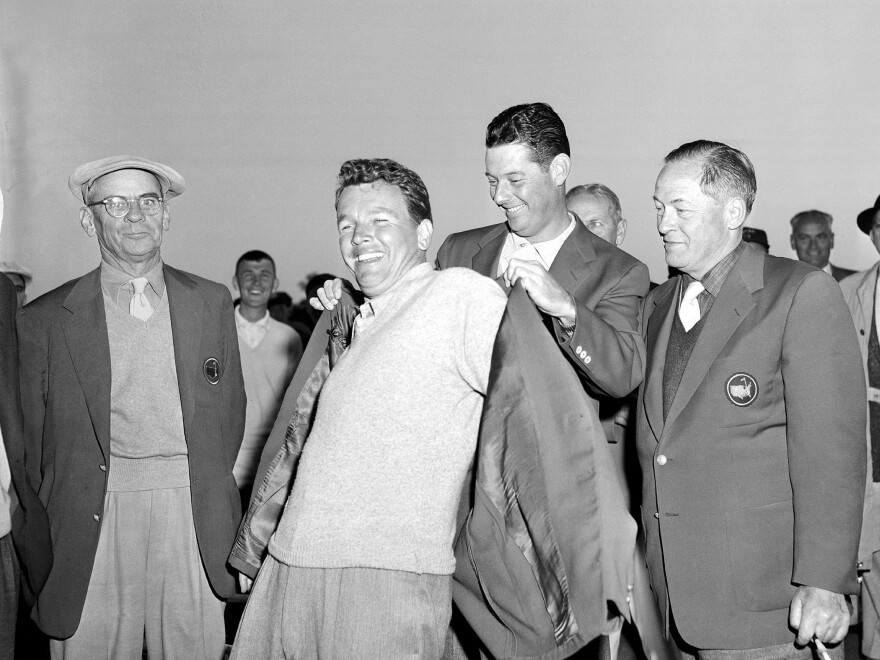Jack Burke Jr., who was the oldest living Masters champion and staged the greatest comeback ever at Augusta National for one of his two majors, died Friday in Houston. He was 100.
Burke, a member of the World Golf Hall of Fame, also won the PGA Championship and was equally skilled as a teacher. He built the fabled Champions Golf Club in Houston and delivered lessons along with a dose of homespun wisdom.
"Why did golf give us 34 rules when God only gave us 10 commandments?" he said over dinner at his home in Houston in 2000, one of endless examples of a sharp wit always grounded in common sense.
His passing was confirmed by Steve Timms, the CEO and president of the Houston Golf Association who spoke with Burke's wife, Robin.
Burke won two majors in 1956 when he was the PGA player of the year, none more famous than his staggering rally at the Masters when he started the final round eight shots behind Ken Venturi. In conditions so blustery only two players broke par, Burke posted a 1-under 71 for a one-shot victory over Venturi, who shot 80.
Later that year, Burke defeated Ted Kroll, 3 and 2, to win the PGA Championship.
Those were among his 16 victories on the PGA Tour, including four straight in early 1952, three of them by six shots or more. He was on five straight Ryder Cup teams and won seven of his eight matches. The lone loss was in 1957 when Burke was a playing captain and Great Britain won for the first time since World War II.
Burke was as much a teacher as a player
Burke's last PGA Tour victory was in 1963, but his career was far from over. He was as much a teacher as a player, and a Texan through and through.
Born in Fort Worth, he grew up in Houston while his father, Jack Burke, was the head pro at River Oaks Country Club. His father died when Burke was serving in the Marines during World War II, where he taught combat skills at Miramar near San Diego.
"They asked me to help with teaching martial arts because, as a golfer, I'm familiar with timing and balance — and both are very important," Burke told the USGA in 2017. "I had been instructing golf all my life because my dad taught me how to teach. So teaching these other things was not a problem."
When the war ended, Burke became a teaching pro in New Jersey and then got a job as an assistant under Claude Harmon at Winged Foot. That led to a club pro job at Metropolis Country Club in New York.
He finished 45th on the money list in nine events in 1949, and he was credited with his first PGA Tour victory a year later at the Bing Crosby Pro-Am at Pebble Beach.
For all he achieved inside the ropes, Burke is equally known for his teaching skills. He could be funny and harsh, always getting his point across, all for the love of the game.
"When a primitive hunter threw a spear at his prey, you better believe he followed through and finished with his weight on his left foot," Burke once said. "Reverse pivots in the jungle could be fatal. That saber-toothed tiger would eat you."
Burke was perturbed when a member at Champions asked him for a quick look at his swing. Burke offered a suggestion and as he walked away, the member said, "Thanks for the tip."
"I don't give tips," Burke wrote in his book. "This isn't Churchill Downs. It took me 60 years to acquire the knowledge necessary to offer that man a suggestion. Just because the advice comprised one sentence doesn't mean it didn't include a lot of thought."
His book was titled, "It's Only a Game," and was published in 2006, two years after he served as an assistant captain at the Ryder Cup in 2004 at Oakland Hills, where Europe recorded its biggest victory. Burke cited the high-priced tuxedos they wore to the gala as an example of how riches in golf had softened the players. He also mentioned how much players seemed to enjoy their time playing table tennis and video games.
"I closed my eyes and imagined Ben Hogan sitting at the car racing game, his hat turned backwards, giggling and shouting to Arnold Palmer, who was waiting his turn," Burke wrote.
He was old-school even when he was young, the son of a PGA professional, a straight shooter from Texas who learned from Claude Harmon and others.
Burke was part of the original PGA Hall of Fame in Pinehurst and was among PGA champions not ushered into the new World Golf Hall of Fame when it opened in 1998 in Florida. But he was the first one selected through the Veteran's Category in 2000.
Burke was among eight inducted that evening and as he stood at the podium on a typical emotional ceremony, he quipped, "With all these tears, I might be standing in casual water."
But he paid a somber tribute to so many PGA professionals who were not in the new shrine, from Harmon to Jack Grout, Johnny Revolta to Paul Runyan.
"Without these great teachers, none of us would be in here," Burke said. "Those fellas are probably not going to get in the Hall of Fame, but I want to say to you tonight, 'You're coming in with me.' I'm bringing the teachers in."
His second wife, Robin, was the Curtis Cup captain in 2016 and helped Burke run Champions. The club hosted the U.S. Women's Open in December 2020. Burke was 97 and still engaging, a twinkle in those blue eyes, irreverent as always.
"The USGA has never owned a golf course," he said that week at his home. "But they come to your course and tell you how to run it."
Copyright 2024 NPR. To see more, visit https://www.npr.org.



